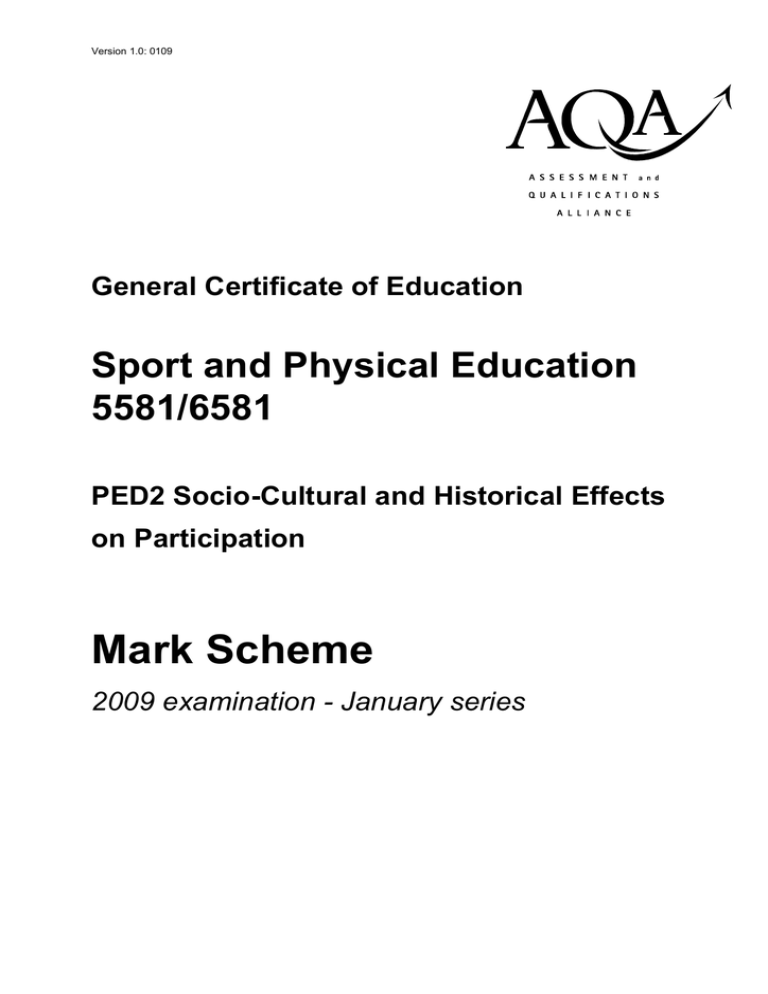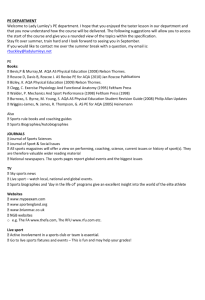
Version 1.0: 0109
General Certificate of Education
Sport and Physical Education
5581/6581
PED2 Socio-Cultural and Historical Effects
on Participation
Mark Scheme
2009 examination - January series
Mark schemes are prepared by the Principal Examiner and considered, together with the
relevant questions, by a panel of subject teachers. This mark scheme includes any
amendments made at the standardisation meeting attended by all examiners and is the scheme
which was used by them in this examination. The standardisation meeting ensures that the
mark scheme covers the candidates’ responses to questions and that every examiner
understands and applies it in the same correct way. As preparation for the standardisation
meeting each examiner analyses a number of candidates’ scripts: alternative answers not
already covered by the mark scheme are discussed at the meeting and legislated for. If, after
this meeting, examiners encounter unusual answers which have not been discussed at the
meeting they are required to refer these to the Principal Examiner.
It must be stressed that a mark scheme is a working document, in many cases further
developed and expanded on the basis of candidates’ reactions to a particular paper.
Assumptions about future mark schemes on the basis of one year’s document should be
avoided; whilst the guiding principles of assessment remain constant, details will change,
depending on the content of a particular examination paper.
Further copies of this Mark Scheme are available to download from the AQA Website: www.aqa.org.uk
Copyright © 2009 AQA and its licensors. All rights reserved.
COPYRIGHT
AQA retains the copyright on all its publications. However, registered centres for AQA are permitted to copy material
from this booklet for their own internal use, with the following important exception: AQA cannot give permission to
centres to photocopy any material that is acknowledged to a third party even for internal use within the centre.
Set and published by the Assessment and Qualifications Alliance.
The Assessment and Qualifications Alliance (AQA) is a company limited by guarantee registered in England and Wales (company number 3644723) and a registered charity (registered charity number 1073334).
Registered address: AQA, Devas Street, Manchester M15 6EX
Dr Michael Cresswell Director General
Sport and Physical Education - AQA GCE Mark Scheme 2009 January series
1
(a)
(i)
1 mark for 3, 2 marks for 6 of:
Activity
Slalom skiing
Rugby
Trampolining
100 m swim
High board diving
Tennis
(ii)
Strategic
Structural
(b)
Category (athletic, gymnastic or game sub-category)
Athletic
Invasion game
Gymnastic
Athletic
Gymnastic
Net game
4 marks for 4 of: (1 mark from each box for max marks) (must distinguish
between strategic and structural)
Football
1. Set plays/formations
2. Positional roles
3. High strategic demand
4. Likely to change due to
opponents play/instant
decisions
8. Invasion game
9. Winner determined by
more goals
10. Complex/lot of rules (not
just rules alone)
11. Indirect contact with
opponents
100m
5. Fast as possible
6. Little strategic demand/
few tactics
7. Pre planned – unlikely to
change
12. Athletic category
13. Winner determined by
being fastest over
distance
14. Quantitative
measurement/stop
watch/objective
15. Simple/few rules (not just
rules alone)
16. Separated from
opponents
4 marks for 4 of:
(sub max 3)
Advantages
1. Health & fitness
2. Encourages pride/loyalty to team/
school/commitment
3. Develops teamwork skills/team spirit
4. Fosters interest for later life/join clubs
5. Self esteem if successful/show skills
to others
6. Preparation for competitive society/
learn to win and lose/control of
temperament/respect officials/rules/
character building/etiquette
7. Higher – skill development – strategic
development/more medals/deeper
understanding of sport
3
Disadvantages
8. Winning emphasis can be over
stressed/over competitive
9. Can lead to negative values such as
cheating/aggression/lose sport ethic
10. Low morale if fail/fear of failure
11. Overtraining/physical stress/injury/
psychological stress/burn out
12. Loss of enjoyment/extrinsic rewards
only
Sport and Physical Education - AQA GCE Mark Scheme 2009 January series
2
(c)
3 marks for 3 of:
1. Government included it in policies such as Raising the Game/A Sporting
Future for All/Game Plan/PESSCLS/Gifted & Talented/PESS/TOPS/high
quality/school club links
2. Teachers could be paid extra by governor discretion/more extra curriculum
3. Sports colleges
4. School sports co-ordinators
5. Academies
6. More money given to develop school sport/better facilities/more curriculum
time given to PE
7. More advertising of school sport benefits/health/fitness/ambassadors
8. Winning of Olympics/school Olympics
9. Activemark [primary]/Sportsmark [secondary]/Gold Awards/Kite marks
10. Coaching for teachers
11. Active schools (active programme)
12. Sport Development Officers/NGB (must justify)
(d)
5 marks for 5 of:
1. Appreciation of the natural environment/travel to new environments (not just
outdoors)
2. Know personal limits/safety values (not just its safer)/self discovery
3. Trust in others/communication/awareness of others/team work
4. Self reliance/decision making/leadership/self discipline/survival techniques
5. Courage/bravery/overcome fear/challenging
6. Opportunities for ‘active leisure’/free time
7. Escape from stress/mental health
8. No social comparison
9. Freedom from rules
10. Health and fitness – physical
11. Intrinsic motivation/fun/enjoyment/adrenaline and excitement
12. Sense of achievement/fulfilment/new skills/self esteem
13. Social/friendship
14. Participation rather than end result/no pressure/at own pace/no fear of failure
(a)
(i)
4 marks for 4 of:
1.
Spontaneous/no pre-set rules (not just ‘no rules’)
2.
Children make up rules/change rules
3.
No constraints on time/boundaries/fluid playgroup/social/friends
4.
Except for adult supervision/safety/sharing space
5.
Intrinsic/fun/non-serious end product
6.
Voluntary/choice
4
Sport and Physical Education - AQA GCE Mark Scheme 2009 January series
(ii)
3 marks for 3 of:
1.
Children have become increasingly inactive/less active play
2.
More sedentary activities e.g. TV/computers/fast food
3.
Less walking to school/safety concerns
4.
Obesity has increased/NHS costs
5.
Proven link between lack of activity in young children and health
problems later in life/loss of productivity in workplace/prevent illness
6.
Lack of participation in sporting activities can lead to lower self
esteem/exclusion
7.
More participation can increase citizens’ levels of skill/achievement/
social skills/inclusion/more medals/more elite performers
(b)
2 marks for 2 of:
1. Discipline
2. Obedience
3. Preparation for work/war (allow fit for war/not just health and fitness)
4. Familiarity with weapons
(c)
4 marks for 4 of:
1. Provide a wide range of activities/options in later years
2. Develop a range of skills/transferable skills/basic skills/basic rules
3. Provide for other roles such as spectator/coach/official
4. Compulsory
5. Provides extra curricula/teams/clubs
6. HRF/understanding need for health lifestyle
7. Use of community facilities
8. Policies such as PESSCLS/improve links between schools and clubs
(d)
5 marks for 5 of:
(don’t accept ‘don’t sweat’ or ‘not physically demanding’)
1. Indoor/comfortable environment
2. Socially acceptable/feminine image
3. Slim/toning/body shape/health based/fitness
4. Fashionable/music
5. Accessible/lot of provision/convenient times/DVDs etc/at home/role models
(celebrities)
6. Developed for women traditionally/women only sessions and clubs/self
confidence
7. Social friendships
8. Non-competitive/no pressure
9. Non-contact
5
Sport and Physical Education - AQA GCE Mark Scheme 2009 January series
3
(a)
4 marks for 4 of:
(sub max 3, don’t need to make a direct link)
Characteristics
1. Played occasionally/festivals/
holydays
2. Few/simple/unwritten rules (not
just ‘no rules’)
3. Violent/injuries/damage to
property
4. Male/wagering/alcohol
5. Low structure/unlimited time and
numbers of participants/few
boundaries (not just
‘unstructured’)
6. Limited facilities/equipment
needed
7. Working classes
8. Force rather than skill
9. Local/village V village
Reflection of society
10. Little free time
11. Uneducated so no written rules
12. Harsh lifestyles/society
uncivilised
13. Little money
14. Little transport/mobility across
country/rural & agricultural/space
15. Reflected division between social
classes
(b)
4 marks for 4 of:
1. Developed rules/written/codification
2. Skills
3. Strategic/tactics
4. Kit to distinguish teams
5. Division of labour/eg attack defence/leadership/captain
6. Boundaries eg pitches
7. Facility/equipment developed
8. Competition – house/inter school
9. Officials/coaches
(c)
4 marks for 4 of:
1. Didn’t have enough time/worked long hours
2. Lack of disposable income/couldn’t afford – equipment/no garden (not
just space)
3. Was not included in state school system until the 20th century
4. Initially amateur development/middle and upper classes
5. Excluded from clubs/local authorities/discrimination by middle class
6. Lack of public provision/local authority
7. Did not have same middle class values/dress codes/etiquette
(d)
(i)
2 marks for 2 of:
1. Segregated sport/participate separately
2. Usually negative about abilities/not safe
3. Can lead to labelling/channelling/narrowing/only do some activities
4. Can lead to discrimination/low self esteem and embarrassment
5. Can have a self fulfilling prophecy eg less provision/less participation
6. Awareness = new legislation and increased opportunities
(improvements)
7. But can lead to channelling (positive) and potential success
6
Sport and Physical Education - AQA GCE Mark Scheme 2009 January series
4
(a)
(b)
(ii)
4 marks for 4 of:
1. Legislation/race discrimination act/government policies/more rights/less
sterotyping
2. Identified as a target group by Sport England/policy to raise
participation
3. NGB’s equity policies
4. More/different sports are available/PE in schools – multi-cultural
approach
5. Health and fitness high priority in society
6. More in positions of responsibility in sports organisations/leaders from
these groups/coaches & managers
7. Greater cultural understanding/media & role models
8. Ethnic clubs’ own leagues (not just more clubs facilities)
(i)
4 marks for 4 of:
1. Improve health and fitness of working classes
2. Social reform/social justice/improve lot of working classes/civic
responsibility/equality/use of increased leisure time
3. Prestige of local area
4. Social control/keep people out of trouble/ away from pubs
5. Increased productivity
6. Civilising of society/rational recreation encouraged/middle class values
7. Raised moral of community/spirit
(ii)
3 marks for 3 of:
1. More leisure time/Saturday half day/bank holidays/factory acts
2. More disposable income/increased wages/spectatorism
3. Improved health
4. Schools/churches encouraged recreation/YMCA church teams
5. Employers/factory owners encouraged recreation
6. Works facilities eg Cadbury factory/works teams/excursions
7. Transport eg railways/bicycles (not cars)/seaside and countryside
8. Awareness through media
3 marks for 3 of:
Reasons
1. Working class won right to
recreation
2. Health benefits/morale boosting
3. Increasing leisure time needed to
be filled
4. Form of social control
5. WW – recognised rehabilitation
effects of recreation
6. Legacy of public schools/state
schools begin to copy public
schools
7. Raising of school leaving age –
needed to have more variety of
activities
7
Implemented
8. 1944 Education Act/LEA had to
provide recreational facilities/
education reform
9. Facilities in schools improving
10. Status of PE
11. Teams/clubs/extra curricula
12. (Recreation focus) National
Curriculum
13. Options programmes in the
1970s/range of activities
14. Dual use/use of community
facilities
15. Policies such as PESSCLS
Sport and Physical Education - AQA GCE Mark Scheme 2009 January series
(c)
4 marks for 4 of:
(sub max 3)
Advantages
1. More choice
2. Better quality facilities (sport & social)
3. Elitist/feel special
4. More opportunity to keep fit and healthy/to participate
Disadvantages
5. More costly
6. Some may not be able to afford
7. ‘Get out’ for local authorities/government
8. Public services could suffer/local authority
9. Elitist/them and us/discriminatory/exclusive
(d)
4 marks for 4 of:
1. Skill development activity through school based PE/wide range
2. Inspirational teachers/role models/ambassadors
3. Encourage links between schools and clubs/PESSCLS/sports colleges
4. Taster sessions run by local club/local authority
5. Introduced by parents/friends/peers
6. Extra-curricular school club/team/school fixtures/tournaments
7. Local club/local leagues/tournaments
8. Training/coaching
9. Develop skills/strategies/tactics
10. Talent identification programmes/selection scouts/trials
8




